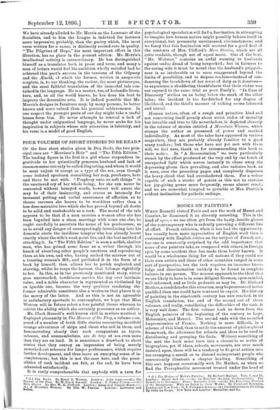FOUR VOLUMES OF SHORT STORIES TO BE READ.*
OF the four short stories given in Day Books, the two prin- cipal ones are " Morrison's Heir" and "The Fifth Edition." The leading figure in the first is a girl whose stupendous in- gratitude to her quixotically generous husband and lack of common-sense can only be called disgusting, and whom it would be most unjust to accept as a type of the sex, even though some isolated specimen resembling her may, perchance, here and there be met with. "Prophesy unto us soft things" is the unuttered cry of her whole being; for she can never be contented without honeyed words, however well aware she may be of their insincerity, and craves so intensely for incessant petting and verbal assurances of affection as to choose caresses she knows to be worthless rather than a less demonstrative love which she has proved beyond all doubt to be solid and unshakeable as a rock. The moral of the tale appears to be that if a man marries a woman after she has been beguiled into a sham marriage with some one else, he ought carefully to ascertain the name of his predecessor, so as to avoid any danger of unsuspectingly introducing into his domestic circle the insidious tempter who has already learnt exactly where the wife's weak point lies, and the best method of attacking it. In " The Fifth Edition" is seen a selfish, shallow man, who has gained some fame as a writer through his knack of absorbing other people's emotions and reproducing them as his own, and who, having sucked the marrow out of a trusting woman's MS., and published it in the form of a book by himself, then allows her to perish neglected and starving, whilst he reaps the harvest that belongs rightfully to her. In this, as in the previously mentioned story, virtue goes unrewarded, tawdriness carries the day over intrinsic value, and a noble character is represented as victimised by an ignoble one, because the very qualities rendering the former admirable constitute also a weakness that places it at the mercy of the latter. And as this is not an agreeable or satisfactory spectacle to contemplate, we hope that Miss Wotton will in future select a less painful theme whereon to exhibit the ability which she certainly possesses as an author.
Mr. Clark Russell's well-known skill in matters nautical is displayed pleasantly in The Honour of the Flag, a volume coin_ posed of a number of brisk little stories recounting manifold Strange adventures of ships and those who sail in them, and demonstrating (dearly that such companions as tigers, baboons, and somnambulists, are de trop at sea even more Than they are on land. It is sometimes a drawback to short stories that they convey an impression of being merely anworked-out schemes for longer performance, which require further development, and thus leave an annoying sense of in- ;ompleteness ; but this is not the case here, and the possi- bilities of each incident are felt, at the end, to have been exhausted satisfactorily. It is easily comprehensible that anybody with a turn for (1.) Day Books. By Mabel E. Wotton. London: John Lane.—(2.) The Honour of the Flag. By W. (Dark Russell. London : T. Fisher IT awin.—(3 ) were Stories By Mrs. W. K. Clifford. London : Adam and Charles Black.— 14.)llen Mountain Woman. By Elia W. ruins. London : Lawrence and Mountain Woman. speculation will find a fascination in attempting to imagine how human nature might possibly behave itself in exceptional, but personally unwitnessed, circumstances; and we fancy that this fascination will account for a good deal of the contents of Mrs. Clifford's Mere Stories, which are all quite readable, though not of equal merit. One of the best, " Mr. Webster," contains an awful warning to husbands against undue dread of being henpecked ; but in fairness to the erring wife it must be noted that the husband's priggish- ness is so intolerable as to seem exaggerated beyond the limits of possibility, and to dispose readers—instead of con- demning the breakdown of her sense of duty as it deserves— to experience a shuddering thankfulness that their virtue was not exposed to the same trial as poor Emily's. "In Case of Discovery" strikes us as being below the mark of the other tales ; the incident is too far-fetched for any degree of likelihood, and the thief's manner of talking seems laboured and unreal.
Human nature, often of a rough and primitive kind and not concerning itself greatly about strict codes of morality but loveable and true to life nevertheless, is depicted cleverly in the volume of stories entitled A Mountain Woman, which stamps the author as possessed of power and marked individuality. As most of the tales have appeared in various magazines, they are probably already familiar to a good many readers ; bat those who have not yet met with them will, we feel sure, thank us for recommending this book to their notice. In "A Resuscitation" we were particularly struck by the effect produced at the very end by one touch of unexpected light which serves instantly to chase away the depressing gloom then prevailing, and also radiates back, as it were, over the preceding pages and completely disperses the heavy cloud that had overshadowed them. For a writer capable of such a stroke of genius as this not to exercise her joy-giving power more frequently, seems almost cruel ; and we are somewhat tempted to grumble at Mrs. Peattie's evident inclination for pathetic endings.


































 Previous page
Previous page